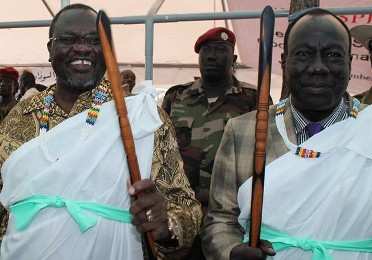S. Sudan rebels say federalism remains top governance choice
February 8, 2015 (ADDIS ABABA) – The rebel faction of the Sudan People’s Liberation Movement (SPLM-IO) led by former vice-president Riek Machar said it had not abandoned the quest for a federal system of governance in the country, vowing the matter remained critical in peace negotiations with president Salva Kiir’s government.

However, officials of the rebel faction explained there was no agreement reached with the government on how to handle or achieve federalism, but added the opposition group had not abandoned the demand.
“We have not abandoned federalism. It is a popular demand of the people. This has remained the top governance choice through which the country shall be able to adequately address devolution of power and wealth-sharing,” the rebel leader’s spokesman, James Gatdet Dak, told Sudan Tribune when reached on Sunday.
“Our leadership is very clear on this time and again,” Dak said.
He said the issue would be further discussed in the upcoming negotiations on governance when the parties resume on 20 February.
The rebel group accused the government of trying to renege on the previous understanding which acknowledged federalism as the popular governance system historically demanded by the people in the country.
Machar’s faction had demanded that federalism should be agreed as part and parcel of a final peace agreement that will be implemented during a transitional period by a government of national unity.
President Kiir’s government however didn’t want federalism to be part of a final peace agreement, saying it should instead be referred to permanent constitutional making process for consideration.
Governors from the three states of Greater Equatoria region who previously had been leading an internal voice in support of the rebel’s demand for federal system however during their recent visit to Addis Ababa seemed to have changed their mind and succumbed to the tone of the government.
In June last year, Equatoria governors sent representatives to the peace talks demanding that federalism should be the system of governance in South Sudan, calling on the warring parties to negotiate and make it part of a peace agreement for implementation.
However, Machar’s spokesperson said the rebel group still believed that the Equatoria governors held their previous position which represented the opinion of the majority in the region.
“We believe the governors will stand their initial ground and continue to represent the opinion of the majority of their people who aspire for federalism now, not later,” he said.
He added the rebel leadership was not surprised by the diversion from the critical issue of federalism to competitions over high executive positions which he said probably forced the governors to instead go after their “immediate short-lived interests at the expense of federalism”.
Last week, governors Clement Wani Konga of Central Equatoria state, Louis Lobong Lojore of Eastern Equatoria state, and Joseph Bakosoro of Western Equatoria state, presented a petition to president Kiir and mediation of the Intergovernmental Authority on Development (IGAD), rejecting a proposal to reinstate Machar in his previous position as vice president, saying this would replace their son, incumbent James Wani Igga.
The Equatoria’s top executives in various public comments also decried the rebel group’s recent restructuring of their region into six states instead of the current three which they govern, a proposal which they seemed to think would reduce their current geographical jurisdictions.
The principals of the two warring parties are expected to return to Addis Ababa on 19 February to further negotiate many of the outstanding issues on leadership structure, power-sharing, governance, security arrangements, reforms and accountability, justice and reconciliation.
IGAD has given 5 March as the deadline for reaching a final peace agreement, which would provide the basis for formation of a transitional government of national unity by 9 July.
However, observers say the March dateline might be unrealistic given the issues that were yet to be agreed upon and the continued violations of the cessation of hostilities agreement by the two parties.
The 14-month-old war erupted in mid-December 2013 when political debates on reforms within the leadership of the ruling SPLM party triggered violence.
Tens of thousands have been killed, while two million have been uprooted from their homes and some four million are threatened by hunger and diseases.
The African Union and the United Nations have warned of sanctions against the parties unless they reach a political settlement and stop the war.
(ST)
